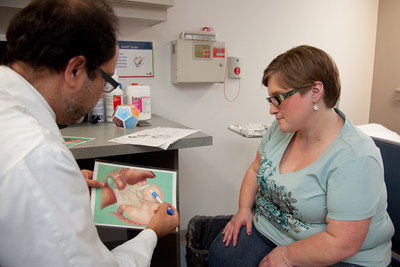Buying Bread or Paying for Your Medication? Public Drug Plans Must Cover Cost of Latest Depression Medications
OTTAWA, May 17, 2017 /CNW/ - Ron Campbell and Brianne Moore — on behalf of millions of other Canadians living with mental illness and depression — have a message for Minister of Health Jane Philpott following her address yesterday at The Economic Club of Canada. Their message is this: an effectively reformed system to review patented medications must include the many people who are currently shut out from getting the latest — and most effective — medications for their depression.
Ron and Brianne are referring to Canada's publicly funded drug plan system, which currently does not cover many of the latest innovative depression medications that Canadians need to treat their illness. Those medications are only available through private health plans.
Right now, Canada's most vulnerable, including veterans, seniors, single parents, Indigenous peoples, the unemployed and homeless people, are shut out. That's because publicly funded drug plans don't cover the cost of the latest innovative medicines designed to treat depression.
All these Canadians, say Ron and Brianne, are part of an untold story.
"It's a travesty," says Ron, a retired RCMP officer with both PTSD and major depressive disorder. He's one of the lucky ones because he has private drug plan coverage. After years of tweaking and crashing, more tweaking and crashing, his specialist found the right combination of medications that make it possible for him to cope — and live.
"I'm finally in the best place I've been in 13 years," says the man who twice came within a hair's breadth of ending his life, once with pistol in hand. "I don't know what I would have done if I didn't have private drug plan coverage."
Ron is concerned about all those others he sees who struggle to get through their day without the benefit of the medication that will work for them — or people like Brianne who sometimes forfeits the medication she needs when she can't afford it.
Brianne is only 19, but she has struggled with mental illness for virtually her entire life and has had to pay for her own medications for the last three years. Life's hard, but things would certainly be easier if her medication was covered under the public drug plan.
"You shouldn't have to choose between buying food or the medication you need to stay mentally healthy," she says. "Unfortunately, sometimes those are the only choices I have."
Ron and Brianne are members of the newly formed Canadians for Equitable Access to Depression Medications (CEADM). CEADM is calling on Minister Philpott to fix the system, ensuring that all Canadians living with mental illness, regardless of their income, have access to the latest medications for depression.
"Minister Philpott is correct to tackle the high price of patented medications, and we are pleased that she has also touched on the important issue of access, but her plan for reform does not go far enough," says Phil Upshall, a member of CEADM's National Leadership Team and National Executive Director of the Mood Disorders Society of Canada. "Yes, developing a common national formulary that reflects the 21st century's 'patient-centered care' philosophy is an important step in the right direction to improve affordability and accessibility. But Canada's inequitable public drug plan system, which leaves many people out in the cold, the hardest hit being the most vulnerable in society and those with no private benefit plan, must be fixed."
"We cannot afford to let an employment lottery dictate who can and who cannot access the medications that restore wellness, quality of life and full functionality that permits Canadians living with a mental illness to become productive members of Canadian society," he adds.
SOURCE Canadians for Equitable Access to Depression Medication


